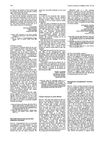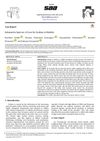 July 2003 in “Journal of Cutaneous Medicine and Surgery”
July 2003 in “Journal of Cutaneous Medicine and Surgery” Treating psoriasis with UVB light three times a week is faster than twice a week, and certain medications and lifestyle factors affect psoriasis treatment outcomes.
 July 2003 in “Journal of Cutaneous Medicine and Surgery”
July 2003 in “Journal of Cutaneous Medicine and Surgery” Skin problems are common in Bangladesh due to arsenic, prompt treatment of diabetic foot ulcers is crucial, maternal transmission causes most neonatal herpes, treatments for pediatric vasculitis are effective, the chickenpox vaccine works, more frequent UVB therapy helps psoriasis, certain jobs increase hand dermatitis risk, monoclonal antibodies treat psoriasis well, lifestyle affects psoriasis, alefacept improves psoriasis, imiquimod cream partially clears basal cell carcinoma, and iron may not help chronic hair loss.
 4 citations,
June 2013 in “The Journal of Rheumatology”
4 citations,
June 2013 in “The Journal of Rheumatology” The document concludes that various findings in rheumatology offer insights into disease severity, treatment responses, and potential risks in medication, with some limitations due to unspecified participant numbers.
 1 citations,
April 2023 in “Biomolecules”
1 citations,
April 2023 in “Biomolecules” Fermented papaya and mangosteen in hair care products helped prevent hair loss and improve hair thickness.
 18 citations,
April 1986 in “International Journal of Cosmetic Science”
18 citations,
April 1986 in “International Journal of Cosmetic Science” Minoxidil promotes hair regrowth in early baldness stages and prevents baldness in non-bald scalps.
 13 citations,
September 2016 in “Cosmetics”
13 citations,
September 2016 in “Cosmetics” Hair care cosmetics affect hair health; know products, ingredients, and procedures.
 86 citations,
October 2017 in “Translational pediatrics”
86 citations,
October 2017 in “Translational pediatrics” Skin changes can help diagnose and manage endocrine disorders like thyroid problems, diabetes, and adrenal gland conditions.
9 citations,
June 2023 in “Cells” Certain natural and synthetic compounds may help treat inflammatory skin diseases by targeting a specific signaling pathway.
 7 citations,
March 2011 in “Expert Opinion on Drug Safety”
7 citations,
March 2011 in “Expert Opinion on Drug Safety” Exemestane is effective and safe for treating certain breast cancers, with mild side effects, but needs more research on long-term effects.
 61 citations,
March 2009 in “The Journal of the American Board of Family Medicine”
61 citations,
March 2009 in “The Journal of the American Board of Family Medicine” Early diagnosis and treatment of discoid lupus erythematosus improve outcomes.
 8 citations,
January 1996 in “Springer eBooks”
8 citations,
January 1996 in “Springer eBooks” Male pattern baldness may be caused by factors like poor blood circulation, scalp tension, stress, and hormonal imbalances, but the exact causes are still unclear.
 1 citations,
August 1995 in “Archives of Disease in Childhood”
1 citations,
August 1995 in “Archives of Disease in Childhood” Minoxidil helped a boy regrow his hair after intense chemotherapy for leukaemia.
 34 citations,
August 2002 in “British Journal of Dermatology”
34 citations,
August 2002 in “British Journal of Dermatology” ALA-PDT is effective and safe for chronic X-ray dermatitis, providing complete or partial remission.
227 citations,
April 2020 in “Cell” More precise, personalized therapies are needed for autoimmune diseases.
 January 2017 in “Clinical approaches and procedures in cosmetic dermatology”
January 2017 in “Clinical approaches and procedures in cosmetic dermatology” Anti-glycation treatments might slow skin aging, but more research is needed.
 June 2023 in “Small animal advances”
June 2023 in “Small animal advances” Selamectin spot-on effectively treats scabies in rabbits.
 July 2022 in “JEADV Clinical Practice”
July 2022 in “JEADV Clinical Practice” The document concludes that different types of permanent hair loss conditions are related and early treatment is key to preventing further damage.
 11 citations,
August 2020 in “Dermatologic therapy”
11 citations,
August 2020 in “Dermatologic therapy” The document concludes that mesotherapy can be effective for skin and hair treatments, but more research is needed to confirm its safety and effectiveness.
 July 2003 in “Journal of Cutaneous Medicine and Surgery”
July 2003 in “Journal of Cutaneous Medicine and Surgery” Some medications can improve skin conditions, while lifestyle factors like smoking and drinking may worsen them; treatments like monoclonal antibodies and imiquimod cream show promise for certain skin diseases.
 14 citations,
January 1985 in “International Journal of Dermatology”
14 citations,
January 1985 in “International Journal of Dermatology” The cause of alopecia areata was unknown, and while various treatments existed, no best treatment was agreed upon.
 January 2020 in “Jornal Vascular Brasileiro”
January 2020 in “Jornal Vascular Brasileiro” Anticoagulant therapy may cause hair loss, especially in women, and stopping the medication can lead to hair regrowth.
 10 citations,
May 2019 in “International Journal of Environmental Research and Public Health”
10 citations,
May 2019 in “International Journal of Environmental Research and Public Health” Finasteride may cause kidney damage.
 318 citations,
January 2022 in “Signal Transduction and Targeted Therapy”
318 citations,
January 2022 in “Signal Transduction and Targeted Therapy” The Wnt/β-catenin pathway is important for body functions and diseases, and targeting it may treat conditions like cancer, but with safety challenges.
3 citations,
January 2017 in “Journal of cardiovascular pharmacology” Re-evaluating minoxidil, reducing sodium intake, and addressing arteriolar hypertrophy can improve hypertension management.
 35 citations,
May 2012 in “Expert Opinion on Pharmacotherapy”
35 citations,
May 2012 in “Expert Opinion on Pharmacotherapy” The document concludes that there are various treatments for different types of alopecia, but more research is needed for evidence-based treatments.
 January 2023 in “Journal of surgery and research”
January 2023 in “Journal of surgery and research” New treatment effectively reverses hair thinning in most patients with mild side effects.
22 citations,
January 2012 in “Mediators of inflammation” Nonantibiotic macrolides show promise for treating various inflammatory skin conditions.
 151 citations,
February 2007 in “International Journal of Dermatology”
151 citations,
February 2007 in “International Journal of Dermatology” Alopecia areata causes hair loss, has no cure, and various treatments exist.
 2 citations,
May 2009 in “Medicine”
2 citations,
May 2009 in “Medicine” Hair and nails can help diagnose diseases, with nail issues often linked to skin conditions and hair loss having various causes and treatments.
 April 2024 in “Pharmaceuticals”
April 2024 in “Pharmaceuticals” Bimatoprost helps with hair growth and eye conditions but can be costly and have side effects.


























